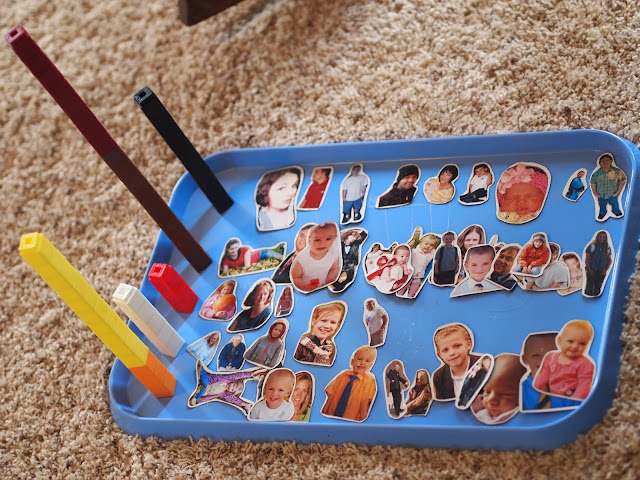Mathematics Curriculum
Math Curriculum for Pre-K2
- Euclidean Geometry
- Math Games
Math Curriculum for Kindergarten
- Euclidean Geometry
- Math Games
- Math Lesson
More than competency, confidence, or even excellence, I want to teach my children the passion and beauty of math. How do I that? Here is my first experiment: Euclid in preschool. We have hung in our dining room, a whiteboard which gets almost as much use as our table. Dinner conversations are often accompanied by diagrams of dental anatomy, and earlier demonstrations from school lessons can easily bleed into dialogue or I-spy games at lunchtime. What would happen if I quietly planted a Euclidean proposition there once a week? There's no demonstration, no explanation of the proof, just the diagram. Behold.
 |
| Euclid's Elements, Book I Proposition 1 |
I don't expect them to learn geometry this way, or even logic. I just want them to be able to envision beauty in math, and to know that I love it.
When we want to teach children to appreciate beautiful music, we surround them with it. They are not required to play all the right answers or reiterate the theory. Teaching children to appreciate fine art is the same; we start by taking them to museums, exposing them to that strange world of visual delicacies, and by filling their environment with as much of the "frosty, frothy stuff" as we can.
So after three weeks conducting my experiment, no one, not even Paul, had even mentioned the diagrams on the board. I felt a little foolish. Well, at least I was having fun. So I kept it up and gradually the kids began asking questions, pointing out shapes, and posing challenges to each other. This all happened on a very simple level, but I think it might be the start of a great tradition.
*Disclaimer: this tradition was wiped off along with so many others when the waves of pregnancy came flooding in. I plan on picking it back up soon. I would also love to find a way to make math more of a social endeavor, but I have no idea how to do that.
[A] seems to be more excited about the fundamentals of math than of reading, so we make sure to include some kind of math game in the learning bag. This week's favorite, the Parking Lot Game, is from happybrownhouse.com, and involves nothing more than rolling a dice and driving toy cars onto corresponding parking spaces. We're just learning the basics right now (numeral recognition, counting, sorting . . .) with no pressure or structure per say.
[C] expects more from her math lessons. They are playful, productive, and tactile.
They involve coloring, gluing, and storytelling, along with "math manipulatives" (=whatever toys happen to be currently scattered on the family room floor).
 |
| Singapore Math book |
 |
| Base 10 Blocks from Mortenson Math (now known as Math-U-See, I believe.) |
I've loved these and
either of which I USE EVERY DAY because you can use them for everything. They are currently, my #2-most-used school supply.
Textbooks
It has worked marvelously for us to use two different curricula: Saxon, which is a spiral-based program, and Earlybird from Singapore, which is a mastery-based program. I used two because one morning for the first time, [C] discovered a concept that challenged her. Without saying a word, she snuck off to her room and cried into her pillow. Up to that point, she regarded herself as "good" at math--and suddenly, she couldn't do it anymore. Showing her an alternative textbook cleared up the tears immediately, and we were able to go back to the first with no problems after a detour. I don't always understand math, and when I don't, what helps the most is to hear it explained again, but differently.
either of which I USE EVERY DAY because you can use them for everything. They are currently, my #2-most-used school supply.
Textbooks
It has worked marvelously for us to use two different curricula: Saxon, which is a spiral-based program, and Earlybird from Singapore, which is a mastery-based program. I used two because one morning for the first time, [C] discovered a concept that challenged her. Without saying a word, she snuck off to her room and cried into her pillow. Up to that point, she regarded herself as "good" at math--and suddenly, she couldn't do it anymore. Showing her an alternative textbook cleared up the tears immediately, and we were able to go back to the first with no problems after a detour. I don't always understand math, and when I don't, what helps the most is to hear it explained again, but differently.
I don't imagine I'll always be able to use two methods, but right now there is plenty of time. I would rather spend all year deepening and quickening her kindergarten skills than accelerating her forward to 1st grade and onward as fast as we can. This is one way to slow us down without bogging us down.
 |
| Math project: a pictograph of our family's hair color |








I think it's neat that you are helping them find the beauty within math. Growing up I HATED math with a glorious passion and just simply felt like I stunk at it. However, since I started my math classes again in college (and especially since being online required that I had to teach myself for the most part) I really learned to love it. I think one of the reasons was also because most of the stuff we worked on was relevant to daily life. I still keep my "Math in the Real World" book with me because I have found it to be extremely helpful.
ReplyDeletePs. I Love your hair color according to family members chart!! haha :}